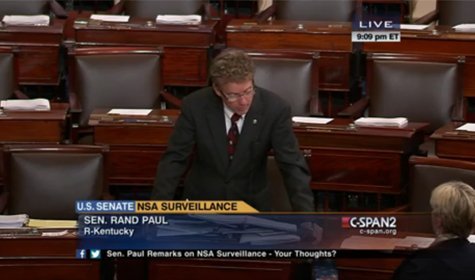Senator Rand Paul has been on the Senate floor filibustering for over 6 hours now to call attention to the re-authorization of the USA Patriot Act.
“There comes a time, there comes a time in the history of nations when fear and complacency allow power to accumulate and liberty and privacy to suffer. That time is now and I will not let the Patriot Act, the most unpatriotic of acts go unchallenged.”
It’s no secret that the Patriot Act has been a massive blow to the liberties of Americans.
So far, via Reason Magazines Blog, Rand Paul has made the following points:
1) Warrants need to be “individualized,” because collective law enforcement is the root of much evil.
Paul’s root opposition to the Patriot Act is that it is being used as the legal justification for the collection of bulk data against unsuspecting U.S. citizens who no one believes have committed a crime. His opposition to the reforming USA Freedom Act is that it still allows the government to compel third-party companies like Verizon to cough up 100 percent of its customer metadata.
Either way, Paul has stressed all day, this is antithetical to both the Fourth Amendment and the American tradition of individual rights. Collective guilt is what underpinned the segregationist horrors of the Jim Crow south, and of the indefensible internment of Japanese-Americans during World War II. The people who really need the Bill of Rights, he has said, are not the prom queens and homecoming kings, but people who are in a disfavored minority, whether ideological, religious, or racial.
2) Internet/telephone/data companies should put up “unified resistance” to federal compulsion to turn over user data.
It’s not every day that you see a sitting U.S. senator calling for straight-up civil disobedience. But in an era where the Supreme Court has yet to definitively rule on the third-party doctrine governing what intermediaries have to do when requested by the government to cough up all user data, building up a bigger cultural expectation of privacy is crucial if our credit-card data and cloud storage is going to be proferred traditional 4th Amendment protection.
3) “We’re using the Patriot Act to put [drug offenders] in prison.”
One of the least remembered scandals in the Summer of Snowden is that the Drug Enforcement Agency has been collecting bulk metadata with all the same gusto as the National Security Agency, even though the DEA is supposed to enfore the law on U.S. citizens who are afforded protections from the Constitution. In fact, the DEA has been using the NSA’s data. Patriot Act mission creep might not be news to Reason readers, but that makes it no less indefensible.
4) “Government by cliff is a recipe for disaster.”
That’s a quote from Sen. Mike Lee (R-Utah), not Rand Paul, though the two have long agreed about this principle. The Patriot Act expires at the end of May. “It’s been three years since we’ve known this date is coming,” Paul said. Why in hell hasn’t there been a debate, with amendments, in the Senate? Why does Capitol Hill lurch from cliff to cliff, instead of actually do the job of governing? I suppose this bad habit of mind is good for certain opportunistic politicians with a sense of theater, but it’s just lousy for the country. The Republicans run the joint; the dysfunction is now squarely on them.
5) “It was done by executive decree, it can be undone by executive decree.”
Paul has continuously bemoaned President Barack Obama’s civil-liberties switcheroo when in office, a topic he talked with me about in a September 2013 (bottom of the post). As he rightly points out, most of the actions civil libertarians are complaining about are pure inventions and executions by the executive branch. If the president cares about this stuff as much as he occasionally pretends to be, he can actually stop collecting the metadata.
6) The government is “using records to gain entrance to people, and then tak[ing] their stuff without conviction.”
The connection between civil asset forfeiture and NSA surveillance might not be immediately obvious, but Paul has done a bravura job in making the link. A government that can take your money—even if you are never charged with a crime—because it doesn’t like the way you deposit it in your bank, is a government that should not be trusted with holding all your seemingly innocuous third-party information.
7) “The Constitution is an end to itself.”
That’s another one from Mike Lee (who, it should be stressed, is wholly in favor of the USA Freedom Act, which Paul opposes on grounds that it still allows for bulk collection of metadata). Too often people try to locate their defense of the founding document on utilitarian grounds; actually, it’s a noble blueprint all on its own.
8) We shoulda listened to William Binney.
William Binney was a crucial, pre-Snowden NSA whistleblower. Don’t know who he is, what he saw, how he was threatened, and why he’s worried about America’s “totalitarian” turn? Read this Nick Gillespie interview with the guy.
9) “The director of national intelligence…wasn’t telling the truth.”
Director of National Intelligence James Clapper famously lied to Congress under oath about the collection of bulk metadata on millions of Americans. All afternoon, Rand Paul has used the word “lied” to describe what Clapper did. It is bracing to watch government misbehavior called by its proper name.
10) “The presumption of innocence is an incredibly important doctrine that we shouldn’t so casually dismiss.”
The fact that this has to be said on the floor of the U.S. Senate is appalling. The fact that it is being said at least offers a little hope.
You can read the full article on Reason Magazine at: http://reason.com/blog/2015/05/20/10-great-points-in-rand-pauls-patriot-ac
If you would like to watch the filibuster you can stream it on C-SPAN HERE.

